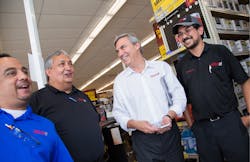Q&A: Advance's CEO on Forming a Disaster Preparedness Plan
On Aug. 25, Texas was hit by Hurricane Harvey, a Category 4 storm that resulted in historic flooding, days without power, and catastrophic damage to property, and led to the death of over 75 people in the Houston area.
On Sept. 27, Tom Greco, president and CEO of Advance Auto Parts, met with team members who were affected by the storm or were involved in the relief efforts. Greco, along with members of the Advance team and a few celebrity spokespeople, including John and Courtney Force, went to visit several stores in the Houston area to provide support and raise spirits.
To date, Advance has raised close to $400,000 through its nonprofit Team Member Assistance Fund to support hurricane relief efforts for the company’s team members in areas that were impacted. The money was quickly distributed to members of the Advance team that were impacted by the storm. The team also made sure that its professional customers were taken care of. The team reached out to see what their needs were and did what it could to help with whatever was needed to open their businesses back up.
This is not the first time that Advance has dealt with a weather crisis. On top of it all, over the past few months, the extreme weather conditions that have been brought on including Hurricane Irma in Florida and Hurricane Maria in Puerto Rico have impacted Advance employees and have tested the team’s preparedness.
“I’ve been in the business a long time, 36–37 years,” Greco says. “I’ve never seen a stream of events like we’ve seen in the last few weeks.”
Thanks to a thoroughly thought out plan for disaster response, Advance was able to rise to the occasion and provide the necessary relief when needed. Greco outlined that strategy for Ratchet+Wrench.
Prior to Harvey, did Advance have a preparation plan for disasters?
We did. We try to prepare for any kind of scenario. Anytime you have something big, something that threatens our team, we activate the crisis management team, in this case, the hurricane response team, led by our asset protection team. I’ve been here for 18 months [interview conducted in October] and we had a good plan in place when I came on board. When you’re a national organization, you’re going to have situations like this that you have to deal with. Whether it’s an earthquake in California, a tornado or one of the recent hurricanes, you need to be prepared.
What are the general steps that you follow for a disaster?
We approach it in three areas: before, during and after the storm. Before the storm, you’re focused on safety. You need to make the announcement that you’re closing stores. You want to make sure that your team is not staying in an area where they’ll be in danger. Communicate with those that will be impacted and let them know exactly how the company plans on handling the situation. As far as your customers, make sure that they know that locations will be closing. During the storm, not much can be done but after the storm, it’s important to get ahold of everyone. We have a system that we track everyone on our team. We try and find out what each team member’s situation is. Do they have food, water? Is there something that they need? If a family has been displaced, we help them out. With our customers, we let them know how long we think a location will be down. We also help our customers out with any needs that they might have, such as supplies, to get them up and running. If a professional customer has had equipment damaged, we go through and provide relief items so they can open their doors.
How did that plan work out during Hurricane Harvey?
Luckily, with hurricanes, you have some notice that they’re coming. For our team member piece, we had close to 100 stores that were in the area of the storm, which meant close to 1000 people on our team. We sent out notices that we’d be closing and we let our customers know locations would be down. Afterward is the scary part. We had to locate all of our team members. It took us four days to track everyone down. We were calling daily, but many were without power and unable to communicate. We have a system where we track each employee and I was checking that every day. Luckily, everyone was safe, but there were many people that were impacted. We made sure to find out what their situation was and get them the supplies that they needed. Our crisis management team went in to assess the damage done and we then figured out what would be needed to get businesses up and running. We also let anyone know that was scheduled to work while their location was down that they would be compensated. We knew that during this time, people would be challenged financially.
We then let our customers know if a store would be down and for how long. The day after the storm, the majority of our locations were open. One of our stores has extensive damage and opened up just last week [interview conducted first week of October]. We did everything we could to meet their demands. We did have difficulties with generators, there was a shortage. We got them wherever we could.
Immediately, we set up a Team Member Assistance Fund. After the storm hit, I sent out an email calling for action. I said, “These people are our family, and we need to make sure that we’re helping.” As a company, Advance immediately made the decision to help people out and match and contribution made. In a situation like this, everyone jumps in. There was no such thing as, “This is my store or my district.” We were one team and one dream.
What are the key steps to making sure that a disaster plan is followed?
You need a documented crisis management process with a set of protocol that everyone knows. It needs to have visibility from the highest level of the company. For us, there are functional sign-offs on each step of the plan. These decisions can’t be made on the fly. We know that when something like this happens, stuff will come up so it’s important to do everything you can to get out in front of it. I would also advise having a single point of contact for the plan. Our head of asset protection had an organized agenda and made sure that all of the functions of the plan were carried out. We had to make decisions in real time, so they called me only if it was necessary. You have to move quickly and decisions are made in rapid fire. It’s important to have a clearly documented plan before something like this happens and have an executive committee sign off on it. It’s also important to have someone managing the actual process during.
What’s Advance’s long term plan for a situation like Harvey?
You obviously can’t control an event like this. In a specific market, like Houston and Miami, hurricanes are a fact of life. We’re going to continue to grow our business in these areas but make sure we’re prepared for events like this. We’re not going to change our business plan, but strengthen it and make sure that we’re ready.
What did Advance learn from the recent hurricanes?
I think you always learn from situations like this. You’re reminded of what’s most important, which is the people that are representing your company every single day and the importance of being there when they need you. It’s not like I didn’t already know that, but to be able to go and actually see the faces of people when we were able to support them was amazing. I heard people tell me that they were an employee for life because we were there for them when they needed us the most. In today’s world of social media, where people can talk about companies, this is something that we need to be doing. The best companies in the world will be providing support to their team members and the ones that don’t will be left behind. We have to take care of our employees.

